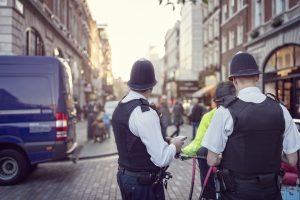The UK police force is broken down into two delineations: Police and Metropolitan Police. Metropolitan police officers work in places like London and while the job duties are not different the pay can be more in cities such as London due to the higher crime rate. There are 14 different police service ranks.
Each police officer is provided with a warrant number. This number is given at the date someone joins the force and is separate than the epaulette ranking and number one receives as a constable and sergeant. police are provided with a divisional number.
The police service ranks differ based on the amount of “power” they have to serve and protect, where higher ranks are going to be in charge of groups of officers versus a constable ranking that is at the bottom of the ranking structure. All police are duty bound to prevent crime, reduce fear, and protect property, individuals and technology. Police are also going to help identify criminals and ensure proper prosecution.

Combating organised crime, terrorism and issues with public order along with working with communities, schools, social workers, criminal justice, health trusts and much more are part of police duties. Housing authorities, businesses, education for communities, diffusing dangerous situations, issuing penalties, helping with road and traffic accidents are a few more areas that police help with. It is also possible that a police officer may be asked to deal with lost or found property, conduct initial investigations (as a constable), gather evidence, take statements, and conduct arrests. All police will need to comply with the laws.
Police Service Ranks
- Police Constable– this is the entry level police ranking. There are chances to be a detective constable or special constable. A detective constable undergoes further training to join the Criminal Investigative Department or investigative unit. Special constables are typically hired during riots or to work as volunteers in times of need. The three titles have the same power.
 Constables are required to work for two years on a probationary system before they can become part of the criminal investigative unit or increase rank to sergeant. Salary is £23,300 to £25,900, with a ceiling at £36,500. Metropolitan constables earn £2,200 more a year.
Constables are required to work for two years on a probationary system before they can become part of the criminal investigative unit or increase rank to sergeant. Salary is £23,300 to £25,900, with a ceiling at £36,500. Metropolitan constables earn £2,200 more a year. - Sergeant– this ranking is senior to constable yet junior to inspector. A sergeant much like a constable deals with day to day operational policing, but some responsibility for supervising shifts of constables is also a part of the job. Sergeants can also work with evidence collection or monitoring. Sergeants may be uniformed or plain clothes. Plain clothes sergeants are usually sergeant detectives working in the criminal investigative department. Salary starts at £36,500 and increases to £41,000. Typically sergeants must remain in the same rank for 4 years before requesting a rank increase.
- Inspector– day to day policing and more supervising capacity is found in the inspector rank. Sometimes inspectors have special roles such as dealing with road traffic for major events. Inspectors can also be plain clothes detectives who are trained for criminal investigative work. Salaries range between £46,700 and £50,700.
- Chief Inspector– this ranking may be given a position as Basic Command Unit Commander or command smaller units in small towns or boroughs. Chief inspectors
can also be in staff positions like detective criminal investigation departments as a senior investigating officer. Chief inspectors tend to head the major investigations such as murder. Salaries range from £51,700 up to £55,900, with a competence increase per year of £1,095. - Superintendent- a person of this rank is usually a leader responsible for operations, criminal investigation, or partnerships with statutory authority. Superintendents can act as senior public order staff members or firearms commanders. Pay is based on a five year scale starting at £62,000 and increasing to £72,500.
- Chief Superintendent– typically this position is the head of a headquarters department or policing area. This person is responsible for policing activity in the area and will report to Chief Constables. The Chief Superintendent is considered the “local chief” meaning all criminal investigation, operations, and local partnerships are directed by the Chief Superintendent. Salaries range from £74,300 to £78,600.
- Assistant Chief Constable– a level above Chief Superintendent, but below Deputy Chief Constable this is a non-London position. There can be one to five assistant chief constables per area. This person is responsible for a specific policy area, but can also have “territorial oversight” of boroughs including two or more. Pay information is non-specific; however, publications show it can range between £86,000 and £100,600. Since the salary is also the same range for Deputy and Chief Constables it is likely the salary will remain on the lower end of the scale.
- Deputy Chief Constable- another non-London position this ranking is considered the senior authority of discipline for each force and also second in command for the policy area. Policy responsibilities are given to this ranking and overall this person watches the performance of all personnel below them. Usually only one person in an area is the deputy chief constable. Pay is stated online as £86,000 to £100,600.
- Chief Constable– The overall boss of non-London forces for a policing area, responsible for all people in below rankings, policy enforcement, and administration of the force. Salary ranges between £86,000 and £100,600 based on area, years as police, and expertise.
Metropolitan Rankings
Metropolitan rankings do not vary from the above until after the Chief Superintendent. Rather than assistant constables up to Chief Constable, metropolitan areas have the following in the chain of command.
- Commander– heads groups of boroughs or a major department. Some have national lead for certain police issues. Pay is similar to Chief Constable: £86,000 to £100,600.
- Deputy Assistant Commissioner– this is London specific in which the person oversees boroughs or departments.
- Assistant Commissioner– this is the equivalent to chief constables on a broader scale. Pay is typically £126,135, but can vary.
- Deputy Commissioner– A similar ranking to Deputy Chief Constable this London or metropolitan based position earns around £140,000 to £247,100 depending on location and years of experience.
- Commissioner– the most senior police ranking in all of UK police forces this person reports to government officials and commands all police. Pay is usually £247,200.